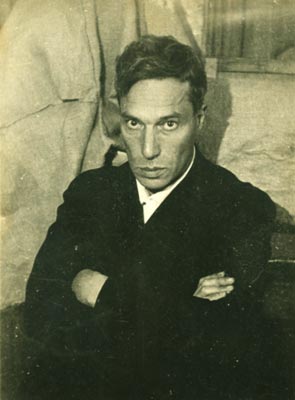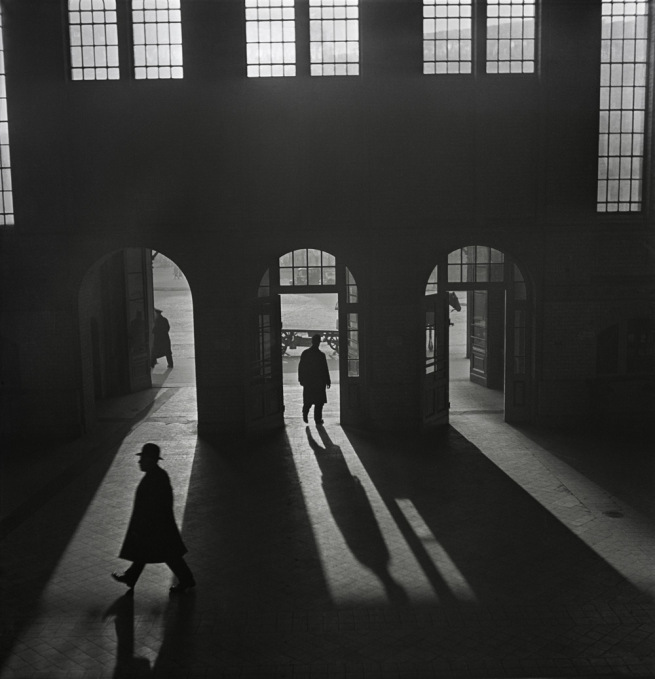Pascal, "Faiblesse de l’homme"
 Sunday, November 10, 2013 at 12:47
Sunday, November 10, 2013 at 12:47 An essay ("Man's weakness") by this French man of letters. You can read the original here.
 It is surprising to see how each of us remains unsurprised by his own weakness. We act in all seriousness, each in pursuit of his own lot in life, not because it is actually worth pursuing as fashion suggests, but as if we knew for certain where reason and justice lay. Along this path we will be disappointed; and by dint of some pleasant humility we will believe it is our fault, and not owing to the methods of which we have always boasted. How good that there exist in our world so many people of this kind, if but to show us that man is quite capable of more extravagant opinions. Why? Because man is capable of believing himself free from this natural and inevitable weakness, and of believing that, on the contrary, he basks in the warmth of natural wisdom.
It is surprising to see how each of us remains unsurprised by his own weakness. We act in all seriousness, each in pursuit of his own lot in life, not because it is actually worth pursuing as fashion suggests, but as if we knew for certain where reason and justice lay. Along this path we will be disappointed; and by dint of some pleasant humility we will believe it is our fault, and not owing to the methods of which we have always boasted. How good that there exist in our world so many people of this kind, if but to show us that man is quite capable of more extravagant opinions. Why? Because man is capable of believing himself free from this natural and inevitable weakness, and of believing that, on the contrary, he basks in the warmth of natural wisdom.
The weakness of man's reason seems more prevalent in those who do not know such weakness than in those who do.
One cannot exercise good judgment if one is too young; the same can be said if one is too old. If one does not think enough, or if one thinks all too much, one becomes stubborn and unable to find the truth. If one judges one's work immediately after having completed it, one will be far too biased. If too long a time has passed, that same work will never be revisited. There is but one indivisible point that remains the true location whence to gaze upon a painting, all other points being too near, too far, too high, or too low. Such a perspective is determined during the very act of painting, yet within the truth and morality of this same determination.
Error's willing partner, which we may term imagination and opinion, is even more deceitful than is her habit. For if she is deemed incapable of a lie, so then will she become the infallible barometer of truth. Yet being more often false, she will reveal no mark of her quality, marking in the same manner both the false and the true.
This splendid power, enemy of reason, one who enjoys controlling and dominating her foe if only to demonstrate such an ability in all matters, has established a second nature within man. She has her happy and her unhappy souls; her healthy and her unhealthy; her rich and her poor; her madmen and her sane. And yet nothing causes us greater vexation than to see her fill her hosts with a satisfaction far more substantial and whole than reason might provide. The talented, as it were, take a certain enjoyment in themselves which the prudent could not possibly experience. They regard others with a majestic sway. They argue with confidence and audacity, while others resort to fear and defiance. And this joyousness of countenance often grants them an advantage in the opinion of onlookers. So many imaginary sages gain the favor of judges of a kindred nature. This splendid power cannot make madmen sane, but she can indeed make them happy, in contrast to reason, who can only make its friends miserable. One showers them in glory; the other covers them in shame.
Who dispenses reputation? Who bestows respect and veneration upon people, works, and historical figures, if not opinion? How insufficient would all the riches of the earth be without opinion's satisfaction?
Opinion has a hold on everything. She creates beauty, she creates justice; and she creates happiness, the pinnacle of this world. I wholeheartedly would like to see that Italian book, of which I know but the title, a title which suits it alone: Della opinione Regina del mundo. I would subscribe to the book's teachings, apart from anything evil, should there be any, without even knowing them.
In changing climates, one will notice almost nothing just or unjust which does not change in quality. Moving three degrees of elevation north changes the jurisprudence entirely. A meridian decides the truth, as a few years may decide possession. Basic laws change. Rights have their eras. Satisfactory or pleasing justice determined merely by a river or a mountain border! Truth on this side of the Pyrenees, falsehood beyond them.
The art of wreaking havoc in a state involves shaking up established customs and penetrating to their very source to expose the flaw in authority and justice. One must, it is said, recur to those basic and primitive laws of the state which some unjust custom has abolished. This is a high-stakes game. Nothing in this equation will be fair. Nevertheless, the people will lend an ear to such discussions because the yoke is shaken as soon as the people are acknowledged, with major figures profiting from such discussions to the people's detriment, as well as to the detriment of those curious examiners of accepted customs. Yet, by a contrary shortcoming, men sometimes believe themselves capable of acting justly in all matters which are not unprecedented.
You can place the greatest philosopher in the world on a plank so large that he may walk as he would ordinarily; yet if below him lies a precipice, no matter how much his reason may convince him of his safety, his imagination will prevail. Many could not even tolerate the thought without turning pale and sweaty – I do not wish to enumerate the effects. Who knows what possesses those who become unhinged upon the sight of cats, rats, or the crushing of a piece of charcoal?
Would you not say that the magistrate whose venerable old age demands respect from everyone is governed by pure and sublime reason, and that he judges things by their nature without wallowing in those vain circumstances that only afflict the imagination of the weak? Watch him now as he enters the room where he is to dispense justice. There he sits, ready to listen, in exemplary solemnity. Now if an attorney appeared, and nature were to bless this attorney with a hoarse voice and an odd patch of face which a barber might have badly shaven, and on which, furthermore, chance had put splotches against his beard, I would bet on the loss of the magistrate's solemnity.
The mind of the greatest man in the world is not sufficiently independent for him not to be troubled by the slightest racket in his immediate surroundings. The boom of a cannon is not needed to interfere with his thoughts; the noise from a weathervane or pulley will suffice. Do not be surprised if at such a time reason fails him. A fly buzzing in his ear is enough to make him incapable of providing good advice. If you want him to be able to find the truth, chase away the animal who holds his reason in check and troubles this powerful intelligence which governs cities and kingdoms.
We have another principle of error, the knowledge of illnesses. These spoil our judgment and our sense. And if great illnesses alter our judgement perceptibly, I do not doubt the smaller ones make a proportionate impression.
Our own interest is still a marvelous means for us gladly to gouge our eyes out. Affection and hate change justice. In fact, to what degree does an attorney, well-paid in advance, find the cause he pleads any more just? Yet by another oddity of the human mind, I know of some who, so as not to fall into such traps of vanity, were in contrary bias the most unjust people in the world. The sure way to lose a very just case was to have it referred to them by their closest relatives.
Justice and truth are two points so subtle that our instruments are too blunt to touch upon them exactly. If they manage to do so they, in so doing, blunt the tip and press down more on the false than on the true.
Old impressions are not the only ones capable of hurting us. The charms of novelty possess the same power. Hence come all the disputes of men who reproach one another, or follow the false impressions of their childhood, or run recklessly in pursuit of new things.
To whom then belongs the happy medium? To that person who appears to have it, and who can prove it. There is no natural principle as to what it may be (even from childhood) which we could not dismiss as a false impression, be it inculcated or sensed. One side will say: just because you believed since childhood that a trunk was empty when you saw nothing there, you believed that this emptiness was possible. This is an illusion of your senses reinforced by custom which science will then have to correct. Others will say: on the contrary, because you were taught in school that there is nothing empty, your common sense has been corrupted. And your common sense understood things so clearly before this bad impression that we now need to correct it by recurring to your first nature. Which has now triumphed, sense or indoctrination?
All of man's occupations are to have some good in them; and the title by which they possess this good is merely in the imagination of those who created laws. There is no force to possess the good for certain: a thousand accidents deprive them of it. It is the same with science: illness removes it from us.
Without grace, man is therefore a subject full of indelible errors. Nothing will show him the truth: everything will abuse him. The two principles of truth, reason and sense, apart from the fact that they often want for sincerity, will mutually abuse one another. Senses will abuse reason through false appearances and will, in turn, be subjected to this same deception as reason will have its revenge. The passions of the soul will trouble the senses and create upsetting impressions. They will lie, and again and again they will deceive.
What are our natural principles if not our accustomed principles? In children, those they received after the custom of their parents, like hunting in animals.
A different custom will yield different natural principles. This we can see in our own experience. And if there are some indelible elements to custom, there are also indelible customs within nature. This will depend on disposition.
Fathers fear that children's natural love will dissipate. What then is this nature subject to dissipation? Custom is second nature, one that destroys the first nature. Why is custom not natural? I fear somehow that this nature might itself be a first custom, like custom is a second nature.
 Pascal in
Pascal in  Essays,
Essays,  French literature and film,
French literature and film,  Translation
Translation 




